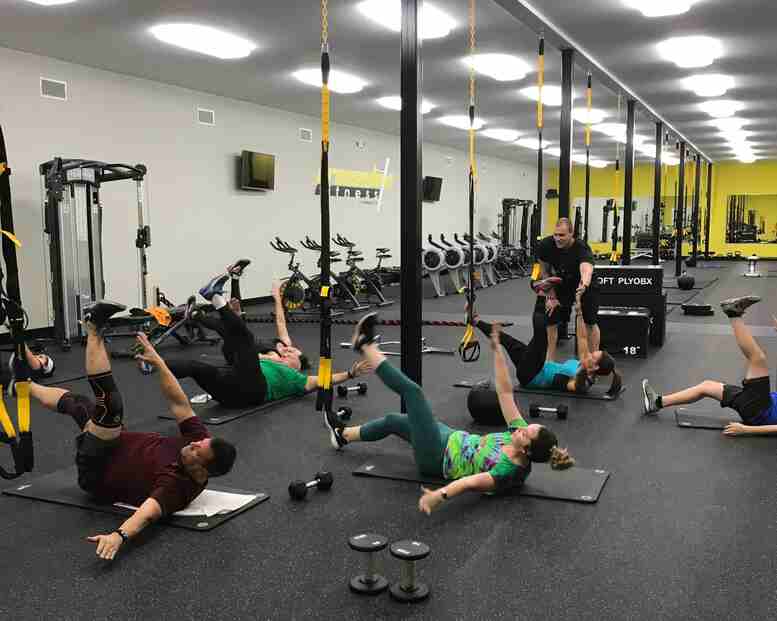Health
Understanding What the Aging Process Actually Looks Like in Practice

Are you worried about what the aging process does to your body?
Right now, there are around 333 million people in the USA. The median age now is 38.7, which most people consider as middle-aged. Most base this around chronologic aging, which is aging based on time.
Does your chronologic age translate to your biological age, though? Gracefully aging is the concern of many, and it shows in how they care for their bodies. Despite this, many have conflicting opinions on what the optimal health for different age groups should be.
To know whether you’re in the clear, read what we’ve prepared below. We’ll discuss what the process looks like in practice. You’ll learn if you’re healthily aging like everyone in your age group should be with this knowledge in tow.
What The Aging Process Does To Your Body
The process affects your entire body. Aging is your body’s natural progression as cells in your body age, after all. However, gray hair and wrinkles aren’t the only things you should worry about.
Eyes And Ears
The eyes are among the parts of the body that come to mind when people think about aging. As you age, you’ll notice your eyes have a harder time adjusting to dim lighting conditions. You’ll also become more sensitive to glare or bright lights.
These happen when you’re around 40-60 years old. However, conditions like early-onset glaucoma can cause blurring to happen well before 40. It’s around this age that your lenses also break down, causing cataracts.
Your hearing also diminishes when you’re around 30-40 years old. It’s rare, but cases like these often happen because of environmental factors. Naturally, these would occur when you’re at 65 and above.
Teeth And Mouth
The most prominent effect of aging on your mouth affects your gums. People often mistake brushing hard as an effective way of cleaning teeth. Because of this, they strip away most of their gum line by the time they’re older.
Receding gums mean the exposure of the roots of your teeth. It makes it more likely that you develop cavities by the time you’re 50-60 years old.
Your salivary ducts have trouble producing saliva as you age. This causes dry mouth, which causes bacteria to build up faster. Your teeth and mouth become more vulnerable to infection because of this.
Reproductive System
Your sex drive goes through the most changes as you age. All this change is thanks to your reproductive system aging along with you. During your later years, drastic changes take place.
Women often experience vaginal dryness. It often occurs after menopause, but it can also happen earlier. Sexual intercourse can become uncomfortable for aging parents when this happens.
Men may lose the ability to have an erection. Total loss isn’t an issue until the later years, around 65 and above. Before that, erections may be softer than they used to be.
Cardiovascular System
Blood vessels lose their elasticity as your body ages. It becomes harder to supply blood throughout your body because of this. So, your heart works twice as hard to pump blood to your extremities.
These increase the risk of certain conditions, like hypertension and aortic disease. Your blood also changes, which doesn’t help the situation. An aging body often produces less blood because of less fluid in the bloodstream.
While WBC count stays the same, less fluid in the blood compromises their ability to fight off invading foreign bodies. Because of this, you’re more likely to develop diseases as you grow older.
Skeletal And Muscular Systems
To the surprise of many, our bones shrink when we hit the age of 30. Bodies have already achieved their peak bone mass when they hit 25. Your body stops focusing on bone growth, which means your bones stay the same length until you hit 30.
What’s great is that you don’t shrink that much. Men only lose around an inch between 30 to 70 years old while women lose two. Bone density also goes down, increasing the likelihood of fractures and breaks.
The decrease in size and density also applies to muscles. You lose your strength, coordination, and even your balance beyond 50. Tendons also become thinner as the water content in the body dwindles.
Digestive And Urinary Tract
Aging adults will notice they need to urinate more in a day. It’s the result of your bladder becoming less elastic as you age. It wouldn’t be able to hold as much without needing to empty it.
You also feel that you have little control over your bladder. This loss of control is because your bladder’s muscles have weakened. Men can also find it difficult to empty their bladders because of an inflamed prostate.
Central And Peripheral Nervous System
Your central nervous system may experience shrinkage as you grow older. Most of the shrinking happens in your brain’s frontal cortex. It rarely happens until you hit 80 or 90.
When it does, though, it will have minor effects on your nervous system. For one, you may notice it’s harder to do many tasks at once. You will also become more forgetful, as is clear with most seniors.
Your peripheral nervous also becomes slower. Sensations will take a while before they register in your mind. It causes you to have slower reflexes and worse coordination when moving around.
Factors That Affect The Aging Process
Certain actions in your life can benefit your body and make the aging process less impactful. Some things can do the exact opposite and cause harm to your body. Here are some things that can harm you as you age.
Lifestyle Choices
Certain lifestyle choices will heavily affect how your body ages. For example, you won’t feel as winded later on if you didn’t smoke beforehand.
Cigarette smoke and smoking habits cause your skin to have wrinkles earlier in life. Nicotine also has a hand in narrowing your blood vessels. This makes it harder for your heart, which already has an increased workload when you’re older.
Your bone and joints will suffer as well if you don’t get enough vitamin D and exercise. It causes them to lose their elasticity faster, which can mean the development of arthritis or similar diseases.
Your choice of occupation can affect your hearing and eyesight. Working in an environment that produces loud sounds can cause earlier hearing loss. Staring at a screen most of the day strains your eyes, leading to the earlier development of cataracts.
Heredity
Sometimes, it’s not your fault that the aging process isn’t going well for you. Some hereditary conditions can make it harsher for you and your relatives. Those with diabetes, for example, will have their gum line recede sooner.
Nerve damage from diabetes can also contribute to the loss of bladder control. Along with obesity and hypertension, it has a role in cognitive decline, too.
What You Can Do To Improve Your Chances Of Gracefully Aging
As mentioned above, some things can make the process go better. Doing the things listed below can help you improve your body before it reaches the point of no return.
Maintain A Healthy Diet
Supplementing your body with the nutrients it needs to fuel a long life goes a long way. Calcium-rich food like dairy products and kale can counteract the regression of bones during your later years. Low-fat protein foods can also help with muscle and cognitive development.
Limiting your consumption of sugary sweets and fatty meat helps your digestive system. It ensures it won’t have trouble processing food when you’re older.
Whole grains and fruits should fill in for fatty food and sugars. These won’t gum up your blood vessels over time. It can help you maintain an active lifestyle with the energy they give, too.
Regular Exercise
Speaking of active lifestyles, exercise more frequently. Constant muscle development prevents the size decrease in your muscles. There are specific exercises that help with specific problems, like how kegel exercises help prevent the loss of bladder control.
What’s great is that exercising helps you lose weight, which is a boon for your health. A healthy weight helps your cardiovascular and urinary systems gracefully age. It also improves strength and stamina, helping you achieve optimal health.
You can achieve your ideal weight faster with the help of establishments like SaunaBar. Click for more information on what you can gain from these establishments.
Maintain Mental And Social Activity
Keeping your brain from shrinking is the most important thing you can do before you’re too old. What’s great is that you can do this with ease by keeping yourself mentally active. Challenge your mind with puzzles, games, and quizzes to keep it sharp.
You can also keep it sharp by maintaining social activity. Aging parents can rely on each other to keep one another company. Social engagement boosts your mood and keeps you sharp through conversation.
Discover How You Fare When Looking At The Aging Process Today
Aging adults need not worry about the negative consequences of aging. Understanding the aging process allows you to fine-tune your life to what’s normal in your age group. Read our guide above and make sure you’re in optimal health today!
Do you want to learn more about your health and wellbeing? Check out more of our guides and posts to see what else you can learn. There’s always something you can do to improve your health, so discover it today!
Health
Make a Difference in Lives by Learning How to Donate Plasma


Understanding Plasma: The Liquid Gold of Your Body
The Science Behind Plasma: What Makes It So Special?
Plasma, constituting approximately 55% of total blood volume, is often referred to as the “liquid gold” of the body. Its golden color is derived from the various proteins and nutrients dissolved within it. Composed mainly of water (about 90%), plasma also contains essential proteins, hormones, electrolytes, and waste products. The most critical proteins, albumin, globulins, and fibrinogen, play pivotal roles in maintaining osmotic pressure, immune responses, and blood clotting, respectively. Plasma serves not only as a transport medium for these proteins and cellular components but also delivers vital nutrients and hormones throughout the body. The unique composition of plasma allows it to perform diverse functions that are integral to human health, making it an invaluable resource in the medical field.
The Role of Plasma in Health and Medicine
In the realm of healthcare, plasma has a multitude of applications. Its derivatives, known as clotting factors, are used in treating hemophilia, a condition that impairs the body’s ability to control bleeding. Moreover, immunoglobulins extracted from plasma are vital in fighting infections and boosting the immune system in immunocompromised patients. Intravenous immunoglobulin therapy is used for patients with autoimmune diseases, helping to modulate and stabilize the immune response. Plasma donation is also crucial in developing therapies for conditions like burns, shock, and trauma, making it a lifeline in critical care situations. The ability to harness the properties of plasma for medical interventions underscores its significance, highlighting the urgent need for plasma donors to support these life-saving treatments.
Myths vs. Facts: Common Misconceptions About Plasma
Despite its importance, there are several myths surrounding plasma donation that can deter potential donors. A common misconception is that donating plasma is painful and excessively time-consuming. In reality, while there is a slight discomfort associated with the initial needle insertion, many donors report that the process is only minimally uncomfortable and takes between 45 minutes to an hour. Another myth is that plasma donation and blood donation are the same; however, they differ significantly. Plasma is extracted via a process called apheresis, where blood is drawn, the plasma is separated, and the remaining components are returned to the donor. Additionally, there is a fear that donating plasma might deplete vital nutrients. On the contrary, the body regenerates plasma rapidly, usually within 24-48 hours, and as a result, regular donation can contribute to a healthy lifestyle. Dispelling these misconceptions is essential for encouraging participation in plasma donation, a vital act that can save lives.
Becoming a Plasma Donor: Your Step-by-Step Guide
Eligibility Requirements: Are You Ready to Roll Up Your Sleeves?
Before you roll up your sleeves to donate plasma, it’s essential to understand the eligibility criteria established by various health organizations. Generally, donors must be at least 18 years old and weigh a minimum of 110 pounds (50 kg). This helps ensure that the donation is safe for both the donor and the recipient. Potential donors must also pass a medical screening, including a health history questionnaire and physical examination, to check for conditions that might disqualify them from donating, such as certain chronic diseases or recent infections. Additionally, individuals with a history of drug abuse or multiple sexual partners may face restrictions. It’s vital for potential donors to be honest during the screening process, as this ensures their safety and that of those receiving the plasma. Being aware of these requirements prepares individuals for the process and encourages a higher rate of successful donations.
The Donation Process: What to Expect When You Donate
Understanding the donation process can significantly alleviate any apprehensions about plasma donation. When you arrive at a plasma donation center, you’ll first check in and complete a detailed health questionnaire. Once your eligibility is determined, you’ll undergo a brief physical examination where healthcare professionals will check your heart rate, blood pressure, and hemoglobin levels. If you qualify, you’ll be seated comfortably in a donation chair, and a healthcare provider will clean your insertion site and insert a sterile needle into your arm. The apheresis machine then draws your blood, separating the plasma from other blood components. This process typically lasts 30 to 45 minutes, during which you are encouraged to relax, perhaps watching a movie or browsing the internet. After the donation, you’ll receive fluids and snacks to help replenish your energy. The professionalism and care exhibited throughout the process ensure that it is both safe and efficient, reinforcing the vital role each donor plays in saving lives through their generous contributions.
Preparing for Your Donation: Tips for a Smooth Experience
Preparation is key to ensuring a smooth plasma donation experience. Staying hydrated in the days leading up to your donation is crucial, as it helps increase blood volume and makes the vein selection process much easier. Drinking water, avoiding salty foods, and ensuring you have a balanced meal before your appointment are essential tips. Additionally, it is advisable to avoid alcohol and strenuous physical activities for 24 hours prior. Wearing comfortable clothing that allows easy access to your arms can also make the experience more comfortable. Bringing a book or music can help distract you during the donation process. Finally, don’t hesitate to ask the staff any questions you have about the procedure; they’re trained to support you and ensure your experience is as pleasant as possible.
The Impact of Plasma Donation: Changing Lives One Drop at a Time
Real Stories: How Plasma Donations Save Lives
The impact of plasma donation can be profoundly illustrated through real-life stories. For instance, consider a young boy named Alex suffering from hemophilia, who relies on clotting factor derived from plasma to lead a normal life. Due to the dedication of volunteer donors, Alex can participate in school activities and spend time with friends without constantly fearing severe bleeding incidents. Another inspiring example is that of Janet, a burn survivor. After a tragic accident that left her with extensive injuries, Janet was able to receive life-saving treatments that included plasma-derived therapies. The collective contributions of thousands of plasma donors nationwide ensure that stories like Alex’s and Janet’s become possible. These narratives emphasize the critical need for plasma donors, illustrating how one person’s act of generosity can create ripples of hope and healing across countless lives.
The Blood Plasma Shortage: Why Your Contribution Matters
As the demand for plasma-derived therapies continues to rise, so does the urgency to replenish the supply. According to recent studies, the United States is facing a significant blood plasma shortage, exacerbated by the increase in autoimmune and rare diseases that require ongoing treatments. Each year, millions of patients rely on these treatments, with around 70% of plasma being used to treat chronic and complex conditions. The current supply chain challenges mean that many therapies are at risk of being disrupted, threatening the health and lives of those who depend on them. By donating plasma, you play a vital role in combating this shortage, ensuring that hospitals have access to the necessary resources to treat patients effectively. Your contributions can literally mean the difference between life and death for individuals waiting for essential therapies.
You’re Not Just Giving: The Health Benefits of Donating Plasma
While the primary motivation for donating plasma is to help others, it also offers notable health benefits for the donor. Studies have shown that regular plasma donation can lead to improved cardiovascular health and lower blood pressure. The act of donating promotes the rapid regeneration of new plasma, stimulating the body’s natural processes and encouraging overall health. Additionally, many donors report feeling a sense of accomplishment and fulfillment from contributing to the greater good, which can enhance mental well-being. Donating plasma can also serve as a gentle reminder for individuals to maintain healthy lifestyles, as eligibility often requires donors to be in good health. This mutual benefit reinforces the notion that plasma donation is indeed a win-win scenario—supporting both the health of the recipient and the donor.
Getting Involved Beyond Donation: Join the Plasma Community
Advocacy and Awareness: Spreading the Word About Plasma Donation
Supporting plasma donation extends beyond just the act of giving; it’s also about raising awareness and advocating for its importance within your community. Advocating for plasma donation can take many forms, from participating in local awareness campaigns to hosting informational sessions. By sharing your experiences and the benefits of plasma donation, you can inspire others to join the cause. Utilizing social media platforms to share stories, statistics, and personal motivations can significantly impact public perception of plasma donation and its critical role in healthcare. Informing friends and family about local donation centers, or even organizing group donations, can create a community spirit around plasma donation, fostering a culture of giving that extends far beyond individual contributions. Your advocacy efforts can contribute to a more informed and engaged community, ensuring larger support for plasma donation initiatives.
Volunteering and Fundraising: How to Make a Broader Impact
Beyond donating plasma, there are numerous ways to support the cause through volunteering and fundraising efforts. Many plasma donation centers rely on volunteers to assist with logistics, educational outreach, and community events, providing a flexible opportunity for individuals to contribute based on their availability and skills. Fundraising initiatives, such as creating campaigns to support local donation centers or organizing charity runs, can raise awareness while also generating funds for essential operations, such as equipment purchases and community outreach programs. Collaborating with local businesses to sponsor events or challenges can amplify your efforts while building strong community partnerships. By leveraging your unique talents and resources, you can significantly enhance the visibility of plasma donation efforts, ultimately leading to a more robust donor base and increased support for life-saving therapies.
Resources for Donors: Connecting with Plasma Donation Centers
Connecting with your local plasma donation center is essential for making the most out of your donation experience. Many organizations have established websites where potential donors can find information about eligibility requirements, the donation process, and upcoming events. Utilizing resources such as the American Red Cross or the Plasma Protein Therapeutics Association can provide additional insights into where and how you can get involved. Additionally, social media groups and community forums can serve as platforms for donor experiences, peer support, and educational resources. Many centers also offer workshops and informational seminars aimed at educating prospective donors about the plasma donation experience and its importance in the medical field. Taking advantage of these resources not only enriches your understanding but also strengthens the plasma donation community as a whole.
Read More: Jacqulyn Elizabeth Hanley
Health
Combat Allergies with Smart Supplement Choices


Millions of people grapple with seasonal or year-round allergies, often turning to supplements to complement conventional treatments. With a growing range of products targeting those whose noses can never rest, hoping to finally get some relief, they often come away disappointed after stumbling upon ineffective formulations. Professional-grade supplements, though—those designed for immune system support and reducing histamine responses—stand out in terms of effectiveness. The trick is to understand how to choose the right bottle.
How Supplements Can Help with Allergies
Allergies start to rear their ugly heads whenever the immune system overreacts to harmless substances, releasing histamines in the process that trigger symptoms like sneezing, itching, or nasal congestion. While antihistamines are the easiest and most approachable way of dealing with this problem, supplements also propose a viable, holistic solution.
- Immune Health Support: Ingredients like quercetin and bromelain help stabilize mast cells, reducing histamine release.
- Histamine Balance: Vitamin C and specific herbal extracts can naturally reduce histamine activity.
- Improves Respiratory Wellness: If you pick a supplement with anti-inflammatory properties, using it can ease airway irritation and congestion.
Key Ingredients to Look For
For those who frequently suffer from allergies, reading the above list alone probably gave you some relief. Don’t worry, we’ve got actual tips here, too, alongside a list of ingredients that can help you ease some of the worst symptoms:
- Quercetin: A flavonoid that calms histamine release and offers antioxidant support.
- Nettle Leaf: Historically used for allergy relief, it helps regulate immune responses.
- Vitamin C: The generic and often underestimated vitamin C also acts as a natural antihistamine.
- Probiotics: These promote gut health, which plays a vital role in overall immune function. Certainly not a must, but a nice-to-have any day!
- Bromelain: Extracted from pineapple, it has anti-inflammatory effects that are beneficial for sinus health.
All combined, these ingredients act synergistically to address the root causes of heavy allergic reactions rather than merely masking symptoms.
Quality Above All: Why Source Matters
Fanciful claims and promises of extraordinary results are one thing. Actually delivering on said promises is another. The unfortunate truth about the current supplement market is that separating fairytale items from the quality players is often more difficult than it should be. After all, it’s your health we’re talking about; there should be no room for smoke and mirrors here.
Regardless, selecting high-quality products from trusted providers ensures potency and safety. Individuals seeking relief should only turn to professional-grade products. Otherwise, you’re likely throwing money down the drain.
Professional-grade products are often:
- Clinically Tested: Backed by research that confirms their efficacy.
- Hypoallergenic: Free from common allergens, like gluten, soy, and dairy, to not exacerbate your issues further
- Free of Contaminants: Manufactured with rigorous quality controls.
With how debilitating and infuriating dealing with your allergic reactions can get, buying cheap simply doesn’t make that much sense. Quality allergy products that are able to actually grant you some much-needed relief are worth all the money in the world, and then some.
The Takeaway
Quality and the right formulation are paramount when it comes to allergies. Opting for professional-grade products tailored to allergy relief can make managing symptoms more effective. If there’s a lesson to be learned here, it’s to take good care of yourself, and prioritize your health any way you can!
Health
Find the Best Gym in Lynchburg – Crosswhite Athletic Club is Here for You


Finding a gym Lynchburg can feel overwhelming because there are so many options. But choosing the right one is very important for your fitness journey. A good gym will not only help you stay in shape but also keep you motivated. Many people struggle to work out alone at home, so joining a gym can make a big difference. When searching for gyms Lynchburg contact Crosswhite Athletic Club it is important to find a place that has everything you need. You want a gym with great equipment, friendly trainers, and fun workout programs. Also, the right gym should make you feel welcome and comfortable. A clean space with a positive atmosphere will help you enjoy your workouts. If you are looking for a gym that offers all these things, contact Crosswhite Athletic Club today. It is the perfect place to start your fitness journey and reach your health goals.
What Makes a Gym Great?
Not all gyms are the same. Some have only basic machines, while others provide advanced equipment and personal training. A great gym should offer a mix of workout options so that people with different goals can benefit. It should also have a supportive environment where beginners feel comfortable. Clean spaces, friendly trainers, and well-maintained machines make a gym even better. When searching for gyms in Lynchburg, it is essential to find a place that meets these needs. Additionally, a gym should provide group classes, weightlifting areas, and cardio machines. This way, you can try different exercises and stay motivated. Many people stop working out because they get bored. But a gym that offers a variety of workouts can help keep things exciting. If you want a place that has everything, Crosswhite Athletic Club is the perfect choice. It is designed to help everyone enjoy fitness and reach their goals.
Why Choose Crosswhite Athletic Club?
If you want a gym that offers everything in one place, Crosswhite Athletic Club is a great choice. It is not just a regular gym—it is a fitness center built for people of all fitness levels. The club has modern exercise machines, expert trainers, and exciting workout programs. Whether you are a beginner or an athlete, you will find the right exercises here. Additionally, the gym is known for its welcoming environment, making it easier for members to stay motivated. Unlike some gyms that focus only on machines, Crosswhite Athletic Club offers personalized training and group sessions. This means you can get the support you need while working out. Also, the club is clean and well-maintained, ensuring a safe and comfortable experience. If you are searching for gyms in Lynchburg, this gym is an excellent option. Contact Crosswhite Athletic Club today and start your journey toward better health.
Variety of Fitness Programs Available
People have different fitness needs. Some want to lose weight, while others want to build muscle or improve flexibility. That is why a good gym should offer various workout options. At Crosswhite Athletic Club, there are many programs to choose from. You can take part in strength training, cardio exercises, and yoga. There are also sports activities like tennis, which add more fun to your routine. Additionally, group fitness classes make workouts more enjoyable and help keep you motivated. If you prefer one-on-one guidance, the gym has personal trainers who can create a plan just for you. When searching for gyms in Lynchburg, finding a place with different programs is important. This way, you can try new workouts and avoid getting bored. If you want a gym that keeps exercise fun and exciting, Crosswhite Athletic Club is the perfect choice.
A Friendly and Supportive Environment
The environment of a gym plays a big role in keeping members motivated. A good gym should not only provide great equipment but also create a welcoming space where everyone feels encouraged. At Crosswhite Athletic Club, the trainers and staff are always ready to help. Whether you are a beginner or an experienced athlete, you will receive the support you need. Additionally, the gym has a friendly community where people motivate each other to do their best. Many people feel nervous when they first join a gym, but a positive atmosphere makes the transition easier. This is why so many people looking for a gym in Lynchburg choose this club. Also, the staff ensures that all machines are safe to use, creating a stress-free workout experience. If you want a gym that helps you stay motivated and feel comfortable, Crosswhite Athletic Club is the right place.
Family-Friendly and Community-Focused
A gym should not only focus on individuals but also provide opportunities for families to stay active together. At Crosswhite Athletic Club, the fitness center is designed to be family-friendly. The gym offers activities for kids, sports training, and wellness programs for all ages. This makes it a great choice for parents who want to set a healthy example for their children. Additionally, working out as a family can be a fun way to bond and stay fit together. The club also has a strong sense of community, where members encourage and support each other. Many gyms only focus on workouts, but Crosswhite Athletic Club goes beyond that by creating a place where people connect and grow. If you are searching for gyms in Lynchburg, this club offers a unique experience that is perfect for individuals and families alike.
How to Get Started at Crosswhite Athletic Club
Starting at a new gym should be simple and stress-free. At Crosswhite Athletic Club, new members can visit, take a tour, and meet the trainers before deciding to join. This helps you feel comfortable and understand what the gym has to offer. Additionally, the club provides different membership options to fit various needs. Whether you want full access to all facilities or prefer specific classes, there is a plan for you. If you are searching for gyms in Lynchburg, you should check out this gym to see what makes it special. Also, the staff is always available to answer questions and help you find the best workout plan. Many people put off joining a gym because they feel unsure, but this club makes the process easy. If you want to start your fitness journey, contact Crosswhite Athletic Club today and begin a healthier lifestyle.
Final Words
Choosing the right gym is the first step toward a healthier life. A great gym will not only help you stay in shape but also keep you motivated and excited about working out. If you are looking for a gym in Lynchburg, Crosswhite Athletic Club is the perfect place for you. With top-quality equipment, expert trainers, and a welcoming environment, this gym has everything you need. Additionally, the variety of workout programs ensures that you will never get bored. Whether you are new to fitness or an experienced athlete, this club offers something for everyone. Plus, the supportive community makes workouts more enjoyable. Instead of waiting, take action today! Contact Crosswhite Athletic Club and explore the amazing facilities for yourself. The best time to start your fitness journey is now, and this gym is ready to help you achieve your health goals.
-



 Biography6 years ago
Biography6 years agoJacqulyn Elizabeth Hanley is the Mother of Liza Soberano?
-



 Home5 years ago
Home5 years agoEpson L3110 Driver Free Download Latest Updated Version
-



 Games4 years ago
Games4 years agoBest Free To Play MMORPG To Try This 2021
-



 Biography6 years ago
Biography6 years agoAmanda Levy Mckeehan Biography, Family, Net Worth, Age, Affairs, Facts
-



 Biography6 years ago
Biography6 years agoWho is Rose Dorothy Dauriac? Scarlett Johansson Daughter?
-



 Biography6 years ago
Biography6 years agoJessica Ditzel Secret Information that Nobody Knows | Joe Rogan’s Wife
-



 Biography6 years ago
Biography6 years agoWhat is the relation of Nathaniel Larry Osorno with Liza Soberano?
-



 Home6 years ago
Home6 years agoLiza Soberano Biography, Age, Family and Boyfriends































